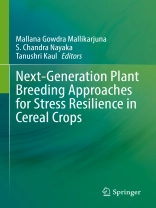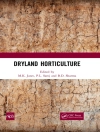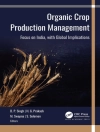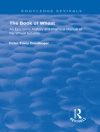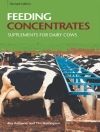This edited book highlights the gravity and efficacy of next-generation breeding tools for the enhancement of stress-resilience in cereals, especially in the context of climate change, pests, diseases, and abiotic stresses. The content of the book helps in understanding the application of emerging genetic concepts and neoteric genomic approaches in cereal breeding. It collates all the latest information about enhancing the stress resilience in cereal crops for overcoming food security issues.
Cereals have predominantly been used as a staple food since time immemorial and contribute more than 50% of the caloric requirement of the global population. However, in cereals, the yield losses due to various stresses are very high, considering the crop growth stage and stress sensitivity. Therefore, to feed and nourish the generations in the era of climate change, it is imperative to develop stress-resilient cereal cultivars. This book explores newly developed next-generation breeding tools, viz., genome-wide association studies, genomic prediction, genome editing, and accelerated generation advancement methodologies, which revealed promising outcomes by enhancing the stress resilience in cereals with yield potential.
This book is useful for postgraduate students specializing in plant breeding, plant stress physiology, plant genomics, agriculture, and agronomy. It is of immense value to scientific community involved in teaching, research, and extension activities related to cereal cultivation.Spis treści
Chapter 1. Next Generation Breeding Approaches for Stress Resilience in Cereals: Current Status and Future Prospects.- Chapter 2. Genome Wide Association Mapping and Genomic Selection Approaches for Stress Resilience in Rice.- Chapter 3. Genome-wide association studies and genomic predictions for climate-change resilience in wheat.- Chapter 4. Genomic Selection for Enhanced Stress Tolerance in Maize.- Chapter 5. Genome-Wide Association Studies and Genomic Selection for Nutrient Use Efficiency in Cereals.- Chapter 6. Doubled Haploidy: An Accelerated Breeding Tool for Stress Resilience Breeding in Cereals.- Chapter 7. Rapid Generation Advancement and Fast-Track Breeding Approaches in Wheat Improvement.- Chapter 8. Integrating Advanced Molecular, Genomic and Speed Breeding Methods for Genetic Improvement of Stress Tolerance in Rice.- Chapter 9. CRISPR Genome Editing Brings Global Food Security into the First Lane: Enhancing Nutrition and Stress Resilience in Crops.- Chapter 10. Genome Editing for Stress Tolerance in Cereals: Methods, Opportunities and Applications.- Chapter 11. Editing Plant Genome with CRISPR/Cas: A Sustainable Strategy for Disease Management.- Chapter 12. CRISPR/Cas for Improved Stress Tolerance in Rice.- Chapter 13. Harnessing CRISPR/Cas tools for installing virus resistance in cereals: An overview.- Chapter 14. Genomic and bioinformatic resources for next generation breeding approaches towards enhanced stress tolerance in cereals.
O autorze
Dr. Mallana Gowdra Mallikarjuna is a Scientist (Senior-Scale) in Genetics and Plant Breeding, currently working at Division of Genetics, ICAR-Indian Agricultural Research Institute, New Delhi, India. He holds a graduation in Agricultural Sciences from the University of Agricultural Sciences, Dharwad, India. He completed the post-graduation from Acharya NG Ranga Agricultural University, Hyderabad and a doctoral degree from Indian agricultural research institute, New Delhi, with university and institute medals for outstanding academic performance. He was awarded several research grants from various funding agencies. His current area of interest includes the application of genomics and systems biology to understand the stress responses in maize and model plants, deciphering the evolutionary snapshots of stress-responsive gene families and stress-resilient breeding. To date, he has 20 research articles in peer-reviewed journals, five book chapters and four maize hybrids. Besides, he has guided post-doc fellows and research scholars for their project work.
Dr. S. Chandra Nayaka is an agricultural biotechnologist specialized in the application of biotechnological tools in plant protection, pathogen detection, and plant-pathogen interaction. He is serving as principal investigator of ICAR-AICRP on Pearl Millet and is a professor at the University of Mysore. He has 20 years of experience in research, including visiting scientist at the Danish Government Institute of Seed Pathology, Denmark, and China Agricultural University, Beijing, China. His main activities pertain to pathogen biology, host-pathogen interaction, epidemiology, and disease management. His group has pioneered full-length genome sequencing of highly virulent strain of the biotrophic pathogen Sclerospora graminicola. He is a recipient of the Japan International Award for Young Agricultural Researchers and The Millennium Plaques Honor by the Indian Science Congress Association. He holds 4 national patents and has published more than 100 research articles, 08 books, 15 book chapters, 03 application notes, and six technical bulletins. Additionally, he regularly guides postdoc fellows and research scholars.
Dr. Tanushri Kaul is a renowned senior scientist and group leader, specialized in plant molecular biotechnology at ICGEB, New Delhi, with pioneering work in nutritional improvement of crops via CRISPR gene editing. She has been awarded DBT-IISc-Post Doctoral Fellowship, Indo-Israel; Indo-German-DST Research Associateship, RGYI-Award; BIOCARE-DBT grant cum fellowship; ASEAN Biotech Award Malaysia; and Global Certificate Course on Data Science & AI. She has significantly contributed to the field of plant molecular biology and biotechnology for 20 years of her research career. She developed phytase-rich tomatoes, wheat grains with low phytic acid, herbicide-resistant maize and rice, and iron and zinc enriched rice. She spearheaded the whole genome sequencing and transcriptomics of rice bean and saffron. She has received four patents for her exceptionally innovative research contribution in the scientific community. She has over 70 publications in international journals, book chapters, and articles. Moreover, she has frequently guided international and national postdoctoral fellows, predoctoral fellows, and MSc students.
